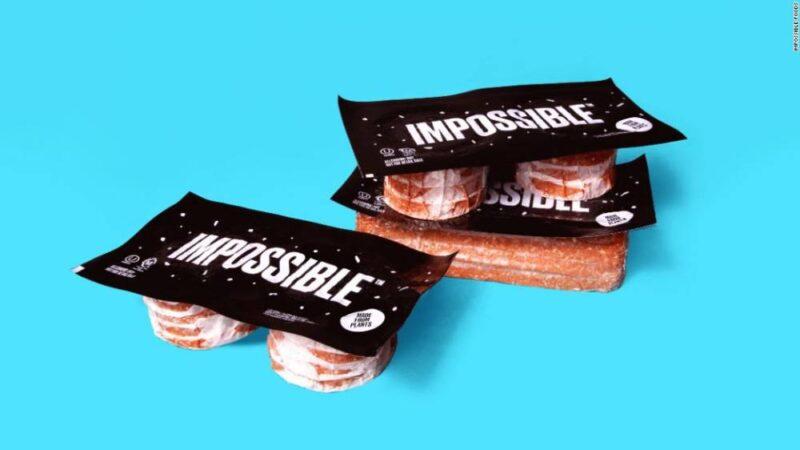Hong Kong (CNN Business)Big food and drink brands really want you to keep consuming what they make during the coronavirus pandemic, and they are coming up with some crafty ways to make it happen.
Impossible Foods became the latest major example of that on Monday. In an announcement shared exclusively with CNN Business, the company said it would start allowing restaurants in Hong Kong to resell their burgers in bulk directly to customers. The move to start treating restaurants more like retailers is part of a broader shift as the industry scrambles to adapt to fallout from the pandemic. Other players, such as Shake Shack and Blue Bottle Coffee, have recently also rolled out new initiatives around the world to try to reach more customers as they spend more time at home.
In Hong Kong, Impossible is sending bulk supplies to a handful of its restaurant partners around the city in the hopes that customers will start picking up its 10-patty packs to try making their own plant-based burgers. The program follows similar initiatives that the company has introduced this year in the United States and Singapore.

Nick Halla, senior vice president of Impossible Foods’ international business, said that the company had been brainstorming how to help its partners diversify as government restrictions hurt demand in Hong Kong, much like other parts of the world.Read More”A lot of what we hear, it’s kind of like a roller coaster,” he said. “We looked at this and said, ‘Okay, this is a really good time for us to bring [the idea] here to support our restaurants.’ To at least alleviate the challenge that they have a little bit. I know it’s a small favor, but it’s something that we can do.”Impossible has already seen an impact. In Singapore, restaurants that participated in the resale program “saw an average increase of 88% in total sales within the first month, with more than half of this coming from direct-to-consumer sales of Impossible Burger,” noted Halla.
A historic crisis
As the slump from coronavirus continues, the trend is expected to grow. More restaurants will likely branch out from their normal operations, and turn to more flexible options, such as delivery services and smartphone ordering, according to Euromonitor International, a market research provider.The pandemic is “by far and away the worst crisis to impact the consumer food service industry in the post World War II era,” researchers wrote in a report in April. “A reshaped industry [is] likely to emerge.” Restaurants can stave off some of the effects by coming up with new formats that don’t rely on dine-in services, researchers noted. They predict that any operator that can combine its offerings with traditional groceries, such as through meal kits and other packaged goods, “will have a significant lifeline.”Coffee Academics, a popular coffee chain in Asia, is one of the businesses participating in Impossible’s new program.In a statement, the company told CNN Business that trying the resale idea was a natural next step for its business as it raced to meet customers’ changing needs.”Consumer demands and shopping habits have altered rapidly under an economy of partial lockdown, and our business has adapted swiftly too,” said Jennifer Liu, chairwoman of the Academics Group, parent company of the coffee chain. “Impossible’s products fit well with our online strategy to meet the rising demand for cooking and dining at home.”
Taking to the streets
It’s not just Impossible. Blue Bottle Coffee, the popular beverage brand that is majority-owned by Swiss food giant Nestle (NSRGF), has set up several vending machines in Tokyo to reach people more easily.The machines, which are cashless, offer passersby a chance to grab some cold brew, instant coffee or branded reusable cups.

Blue Bottle Coffee’s new vending machines in Tokyo. The company says it could expand the idea if they are successful.While the idea is not new, it came at a good time, according to Blue Bottle. The company said that if the initiative proves successful, it could expand the concept and add more machines in other locations.”Although [this] was planned pre-pandemic, we are happy to be serving people’s needs, especially amidst the summertime heat and humidity in Tokyo,” the company said in a statement.
Burgers and bandanas
Another iconic burger brand, Shake Shack (SHAK), is also seizing on the do-it-yourself trend. In April, it launched meal kits in the United States, allowing customers to assemble their own Shack burgers at home for the first time.The set includes beef patties, potato rolls, cheese slices and Shake Shack’s signature sauce — “all the same ingredients we do,” the company said. It declined to disclose sales from the initiative.This summer, the burger chain is doubling down on that idea. It rolled out “Shack Camp,” another box set offering that promised to provide supplies for six weeks of activities to families cooped up at home.This time, the box is supposed to sell an experience. It comes with water balloons, bandanas, an ice cream scoop and sprinkles — along with vouchers for free burgers and a suggested itinerary.
“Make your own lemonade stand, whip up summer sundaes, tell scary stories around the campfire, flex those creative muscles with camp crafts, throw the ultimate field day and get involved in your local community,” the company said in a statement.Businesses are making no secret of their intention to remind customers that they’re still around — and hungry for business. “It’s no secret that summer feels different this year,” the burger chain noted. “But Shake Shack is still here.”
Source: edition.cnn.com

